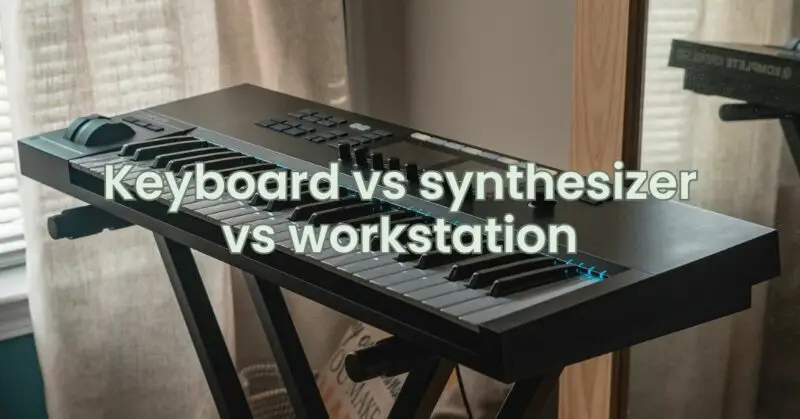When it comes to creating music or playing the keys, various instruments are available to musicians and enthusiasts alike. Three popular options are the keyboard, synthesizer, and workstation. Each of these instruments serves a unique purpose and offers different capabilities. In this article, we will explore the differences between a keyboard, a synthesizer, and a workstation to help you make an informed decision when choosing the right instrument for your musical journey.
Keyboard:
A keyboard, in its most basic form, is a set of keys or buttons arranged in a specific order, similar to a piano keyboard. It can be a standalone instrument or part of a larger setup. Keyboards come in various sizes and configurations, from small portable MIDI controllers to full-sized, weighted-key digital pianos. Keyboards can produce a wide range of sounds, but their sound generation capabilities might be limited compared to synthesizers and workstations.
Key Features of a Keyboard:
- MIDI Controller: Many keyboards function as MIDI controllers, allowing you to trigger and control external synthesizers, software instruments, and digital audio workstations (DAWs).
- Piano Emulation: Some keyboards are designed to replicate the sound and feel of an acoustic piano, with weighted or semi-weighted keys.
- Basic Sound Library: While keyboards can produce various sounds, their sound libraries are often limited compared to dedicated synthesizers and workstations.
Synthesizer:
A synthesizer is an electronic musical instrument designed to create, manipulate, and generate a wide array of sounds. Unlike a keyboard, synthesizers focus primarily on sound synthesis and sound design capabilities. Synthesizers can be monophonic (producing one note at a time) or polyphonic (producing multiple notes simultaneously). They are highly versatile instruments used in various music genres, including electronic, pop, and experimental music.
Key Features of a Synthesizer:
- Sound Synthesis: Synthesizers use different methods of sound synthesis, such as subtractive, wavetable, FM (Frequency Modulation), and granular synthesis, to create unique and diverse sounds.
- Sound Design Flexibility: Synthesizers offer extensive sound design capabilities, allowing musicians to shape and sculpt sounds in real-time.
- Versatility: Synthesizers can reproduce traditional instrument sounds, as well as generate futuristic and experimental sounds.
Workstation:
A workstation is a comprehensive and all-in-one music production instrument that combines the features of a keyboard, synthesizer, and a sequencer. Workstations are powerful tools used for composing, arranging, recording, and producing music. They typically include a vast sound library, onboard effects, and a sequencer for MIDI and audio recording.
Key Features of a Workstation:
- Sound Library and Synthesis: Workstations come with an extensive sound library that includes a wide range of instruments, including pianos, strings, synthesizers, drums, and more. They often include advanced sound synthesis capabilities.
- Sequencer and DAW Integration: Workstations feature built-in sequencers for MIDI and audio recording, allowing you to create complete songs directly within the instrument.
- Performance Features: Workstations may have advanced performance features, such as real-time control knobs, pads, and faders, providing flexibility during live performances.
Choosing the Right Instrument:
The choice between a keyboard, synthesizer, or workstation depends on your musical goals, preferences, and budget. Here are some factors to consider:
- Playing Style: If you primarily want to play piano-like sounds and prefer the feel of weighted keys, a keyboard or a digital piano might be the best choice.
- Sound Design: If you’re interested in creating unique and experimental sounds and enjoy sound design, a dedicated synthesizer will suit your needs.
- Music Production: For comprehensive music production and composing capabilities, a workstation offers an all-in-one solution.
- Budget: Consider your budget, as workstations and advanced synthesizers can be more expensive than basic keyboards.
In the end, the best instrument for you is the one that complements your musical aspirations and inspires you to explore the limitless world of music creation. Whichever instrument you choose, embracing the joy of making music will undoubtedly lead to a fulfilling and enriching musical journey.

